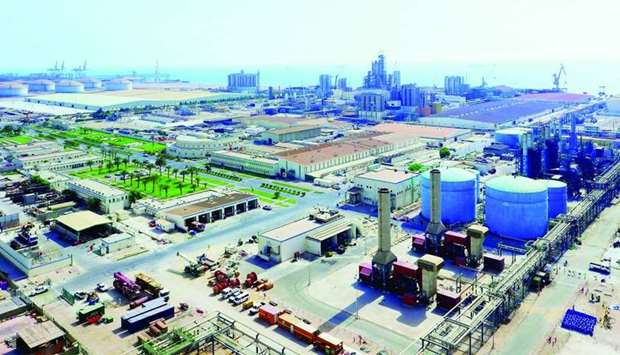Industries Qatar (IQ) has posted a net profit of QR700mn in the first quarter of this year.
The Q1 net profit was down 47% (QR600mn) on the same period in 2018, primarily due to a “combined effect” of moderately lower prices, slightly decreased sales volumes, and a slight increase in the operating costs.
The region’s industrial giant with interests in the production of a wide range of petrochemical, fertiliser and steel products, however, maintained a “strong liquidity position” as total cash across the group stood at a healthy QR9.9bn after paying 2018 dividends of QR3.6bn.
The company’s earnings per share stood at QR 1.11 in Q1, compared to QR2.1 for the same period in 2018, when IQ had registered a net profit of QR 1.3bn.
The net profit in the first quarter was “impacted by weaker prices and periodic maintenance’, IQ said on Monday.
During the current reporting period, the group operated under tightened trading conditions, as demand for products remained somewhat low and the product prices have softened. Product prices on average have declined by nearly 9%, which has contributed for a nearly QR400mn reduction in the group’s net earnings.
Overall sales volumes, on the other hand, were also slightly down on the backdrop lower production on account of periodic maintenance.
The cash position across the group remained strong with total cash across the group of QR9.9bn (after paying the 2018 annual dividend of QR3.6bn) and total debt of only QR25.5mn, reflecting the group’s strong liquidity position.
Reported revenue under IFRS 11 for the period that ended on March 31 was QR1.3bn, a marginal decrease of 8.4%, over the same period of 2018. This year-on-year reduction was due to a moderate fall in the prices of the group’s steel products following “muted demand and excess supply” in the key markets, despite a slight improvement in the sales volumes.
On the other hand, on a like-for-like basis, management reporting revenue – assuming proportionate consolidation – was QR3.5bn, a decrease of QR500mn or 12.3%, compared with the same period last year.
“This year-on-year reduction was primarily driven by a moderate reduction in the product prices across all segments, most notably in the prices of petrochemicals and steel products, and muted demand in some of the major buying countries. The reduction was also further magnified by the lower sales volumes due to weaker demand and lower production volumes on account of periodic maintenance,” IQ said.
Prices of petrochemical products were moderately down compared to the same period in 2018, IQ said.
A marginal reduction in crude oil prices, and muted demand in some major markets due to unfavourable economic conditions resulted in weaker petrochemical product prices. Petrochemicals sales volumes were also down on last year due to periodic planned shutdowns in one of the joint ventures.
Fertiliser prices, on the other hand, have improved marginally compared to the same period in 2018, IQ said. The increase was driven by improved demand from some of the large agricultural economies, together with increased raw material costs and regulatory pressure on non-environment compliant producers. Sales volumes, however, were marginally down last year.
Prices in the steel segment were also down year-on-year due to a number of reasons, including lower demand and higher competition. In the domestic market, the prices were affected by the relatively lower demand in the current period, while the regional demand was also affected by the availability of low price steel from non-GCC producers, especially Turkey.
Prices in other markets, like the Far East, were affected by the supply of low cost steel from countries like China. Nevertheless, the segment was able to maintain its sales volumes as these volumes have marginally increased on last year, IQ noted.

